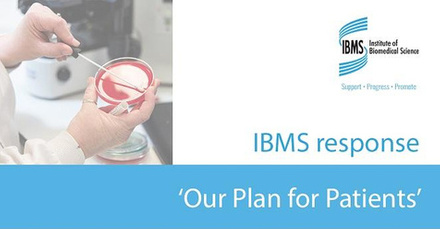IBMS monkeypox statement
As new cases are identified in England, and now Scotland, the IBMS is committed to supporting UK Health Security Agency (UKHSA) and laboratory colleagues in the rapid diagnosis of suspect cases. The latest reports bring the total number of monkeypox cases confirmed in the UK since 7th May to 78 (as of 24th May).
While the current outbreak is significant and concerning, the risk to the UK population remains low. A notable proportion of cases detected have been in gay and bisexual men, so the UKHSA continues to urge this community to be alert to monkeypox symptoms.
Laboratory and healthcare professionals have once again risen to the challenge, providing guidance to both Clinical Commissioning Groups (CCG)/Integrated Care Systems (ICS) and sexual health teams. The IBMS recommends all laboratory teams prepare protocols for handling and transport of samples to Rare and Imported Pathogens Laboratory (RIPL), Porton Down, along with appropriate risk assessments regarding Infection Prevention and Control.
IBMS President Debra Padgett commented:
Our Pathology teams are still working extremely hard dealing with the COVID testing provision and are now also working in conjunction with UKHSA colleagues in preparation for rising monkeypox cases. We will continue to provide support to Integrated Personal Commissioning, Sexual Health and CCG/ICS teams as this current outbreak develops - although, we would anticipate relatively low numbers once contact tracing and isolation procedures are established. We also reiterate the advice from public health colleagues and advise those who have been contact traced and remain well to stay at home for the 21-day isolation period.
For up-to-date advice and guidance please refer to Monkeypox cases confirmed in England – latest updates - GOV.UK (www.gov.uk)
Monkeypox - key facts:
- Monkeypox is caused by monkeypox virus, a member of the Orthopoxvirus genus in the family Poxviridae.
- Monkeypox is a viral zoonotic disease that occurs primarily in tropical rainforest areas of Central and West Africa and is occasionally exported to other regions.
- The main usual hosts are particular species of rodent and non-human primate. Humans can acquire the disease through contact with an infected animal or by eating undercooked bush meat.
- The clinical presentation of monkeypox resembles that of smallpox, a related Orthopoxvirus infection which was declared eradicated worldwide in 1980. Monkeypox is less contagious than smallpox and causes less severe illness.
- The incubation time for monkeypox is 5-21 days.
The infection typically presents clinically with symptoms of fever, headache, myalgia and extreme lethargy. Unlike other common infections, swollen lymph nodes are also a notable feature. This stage lasts for a few days, during which the patient can transmit the virus to other humans via droplet infection.
One to three days after the onset of fever, the characteristic vesicular rash appears. It tends to start on the face and then spreads to the extremities. Most people notice lesions on the palms of their hands and soles of their feet. The virus can also be detected in the oral mucosa and, in a smaller number of cases, in the eyes and genital region.
At this stage, the patient can transmit the virus to others through physical contact or via fomites contaminated with virus from the lesions – e.g. surfaces, bedding or clothes.
- Monkeypox is usually a self-limited disease with the symptoms lasting from 2 to 4 weeks. However, severe complications can occur, particularly in the elderly, young children, pregnant women and the immunocompromised. These include pneumonia, sepsis, encephalitis and loss of sight due to corneal infection.
- Sequencing of virus isolates from the current outbreak indicate that it is a West African strain. The reported case fatality ratio for this is around 3%.
- Vaccines used during the smallpox eradication programme have also provided protection against monkeypox. A new smallpox vaccine was licensed in 2019 and this has been approved for prevention of monkeypox.
- An antiviral agent, Tecovirimat, developed for the treatment of smallpox has also been licensed for the treatment of monkeypox. This drug inhibits the activity of the VP37 viral envelope protein, which thus prevents the production of progeny virus from an infected cell.





